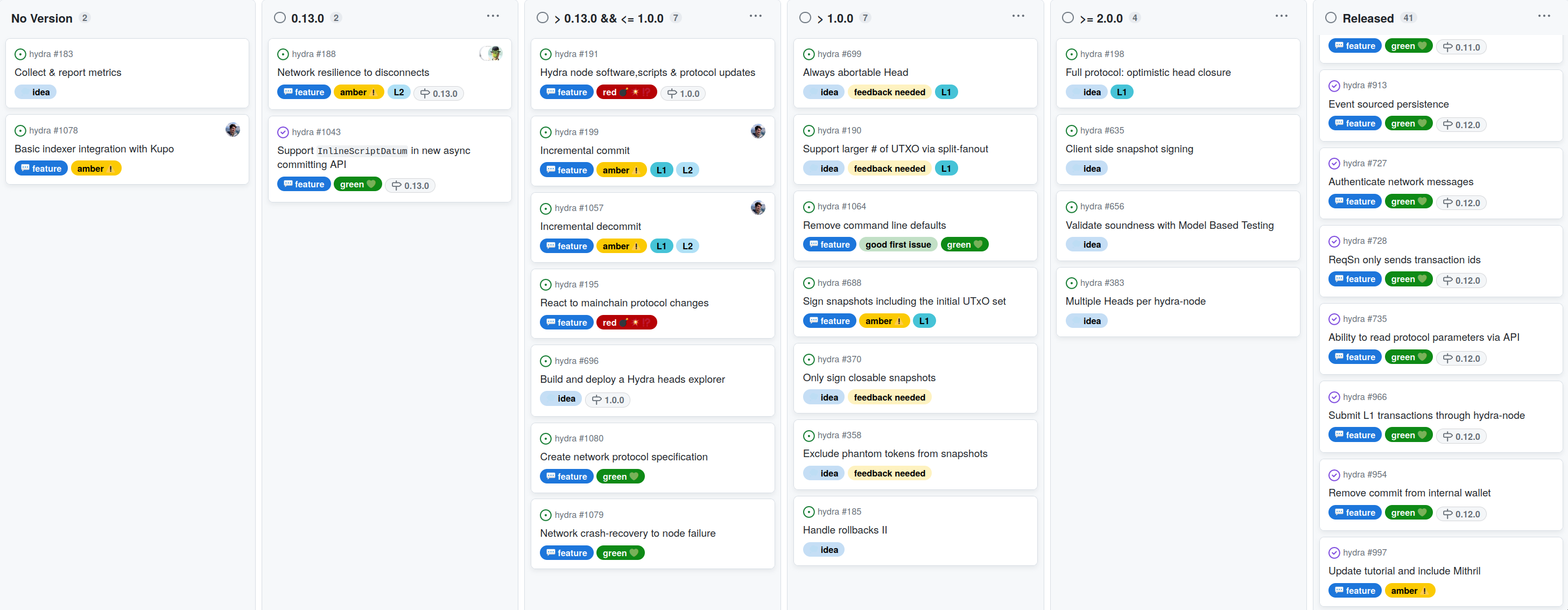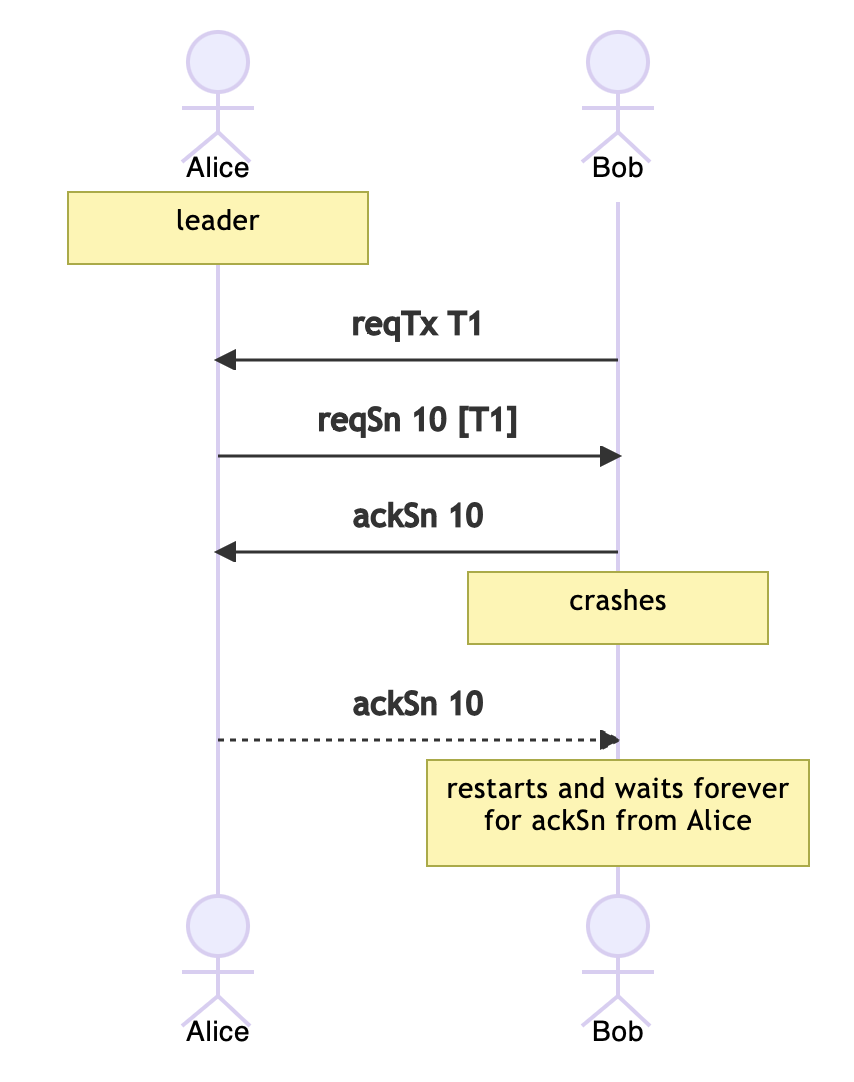This report summarizes the work on Hydra since August 2023. It serves as preparation for the monthly review meeting (see slides and recording), where the team updates project stakeholders on recent developments to gather their feedback on proposed plans.
Roadmap
This month, the roadmap has not changed much as the team mostly clarified upcoming features.

Notable updates
-
Added and completed support for inline datums in commit API #1043, which was reported by a user.
-
Current work on network resilience #188 yielded two new / follow-up items #1079 and #1080. To minimize the 'scope creep' from this topic, the team has narrowed down the direct goal to improve the situation incrementally.
-
When detailing the design of incremental de-/commits, the feature was also split in two. Each of the features would have a different impact on the user experience and relates to other ideas:
-
Incremental commit #199 is a bit more complicated, but paves the way for directly open heads and could make Always abortable head #699 redundant.
-
Incremental decommit #1057 is fairly straightforward and can be evolved into 'partial fanouts', which solves similar problems as the split-fanout #190 and only signing closable snapshots #370 would address. Also, the optimistic head closure #198 feature is closely related to this item.
-
-
Added a new feature to improve user journey of running the
hydra-nodeby removing the command line defaults #1064. This came out of prior idea discussion #454 which highlights the life cycle of ideas and features on the Hydra project.
Cardano Scaling workshop in Nantes, France
From 2023-09-12 to 2023-09-14, most of the Scaling Tribe members, that is the two Hydra and Mithril teams, met for a three-day workshop in the beautiful French city of Nantes. This workshop was run following the Open Space technique which makes room for every participant to experiment and focus on what's of interest for them at the time while being engaging for the whole team. Here is a selection of topics covered that were most relevant to Hydra.
Aiken validator experiment
As part of the workshop, we explored how hard it would be to implement one of
the Hydra validators in aiken. After roughly two hours of work we had a
hydra-node running, tests passing and benchmarks of verifying one step in the
Hydra protocol using aiken.
The hydra-node just uses the UPLC binary and its hash to construct
transactions, we could rely on the same interface, with the difference that the
script binary gets produced by aiken. Aiken does produce a socalled blueprint
plutus.json containing the contract. We staged that file into git and embedded
it into a Haskell interface to be able to reference the compiled script as
SerialisedScript from hydra-node.
Next, we ported the simplest contract we have, namely the
Commit
validator, to
Aiken.
This was fairly straight-forward and we test were passing after some fiddling
with internal representations of data structures (plutus-tx is encoding triples
as Constr data on-chain).
The results? A significant reduction in script size, cpu and memory usage on
collect and abort transactions - or in different words, doubling the
supported
number of parties in a Head. 🎉
Shallow cardano-node experiment
Running a hydra-node requires running a cardano-node, and running a cardano-node requires synchronisation with the chain and about 150 gigabytes of data to be downloaded and verified, which is a significant barrier to quickly spin-up hydra-node and Hydra Heads. Given a Hydra node does not need to look at the history of the chain, a Shallow cardano-node that can run without the full database of immutable files would be fine, assuming we can retrieve a recent state of the chain with the same security guarantees than a fully synchronised chain. This is exactly what Mithril can provide!
We ran a small experiment, trying to start a cardano-node manually removing all but the last files from the immutable DB and it worked as long as one does not query the node for a block too old in the past. This lead us to envision an improved user experience for installing and running a hydra-node, by packaging it with a cardano-node and a mithril-client to retrieve only the minimum needed state and be able to start a fully functioning hydra-node in minutes.
Other topics
- We continued working on Kupo x Hydra integration, benefiting from the presence of Kupo's creator and former Hydra team member, Matthias Benkort
- We brainstormed possible synergies between the Hydra and Mithril projects, something that solidified into the desire to explore this concept of "Shallow node" and its integration within Hydra
- We discussed and clarified our new Security Vulnerability Disclosure Policy
- Discussing the idea of a joint documentation effort, we realised the existing documentation of both teams could be improved, for example by following a Standard documentation framework.
Hydra development
Issues and pull requests closed since the last report
This month, the team worked on the following:
Network resilience to disconnects #188
If a Hydra node crashes, it can recover its state from disk thanks to the event-sourced persistency mechanism in place. But if a peer inside the head sends messages while the node is down, these messages are lost for this node and this can well lead to the head being stuck.
For instance, in the following picture, we see that if Bob was down when Alice acknowledged snapshot 10, then it will wait forever for this acknowledgement and will refuse to move forward with the head, making it stuck.

Hydra is designed to deal with non-cooperative peers in a very safe way: close the head! And this situation could be generalized as a non cooperative peer situation. So the safe move is to just close the head.
But practically speaking, closing the head every time a node restarts or a network connection is interrupted can lead to an operations nightmare. So the question we're exploring is, can we distinguish between non cooperative peer or just transient communication issue?
- ADR 27 gives details about our current strategy
- #1074 is a first implementation of this strategy
- #1080 should specify the resulting network protocol so that others could implement compatible hydra nodes
Incremental commits and decommits #199
In the beginning of this month, some progress on incremental commits and
decommits was made. An early
experiment about the
off-chain / node logic showed that we can re-use the /commit validator and
motivated design work on the feature items.
As mentioned above, the protocol extension was split into two items Incremental commits #199 and [Incremental decommits
1057. Both items contain
high-level description, interaction outline and a first design of the on-chain validators which is currently getting discussed by the Hydra contributors and researchers.
Especially the incremental commit is not trivial as the interaction between layer 1 and layer 2 is quite intricate. Observing a deposit on the Cardano mainchain may not be seen by all parties at the same time and this should not lock up the layer 2 process of transactions, while premature usage of committed funds is to be avoided. On the other hand, each step in the protocol needs to be secure in presence of an adversary and unlocking of committed funds must always be possible.
Once this validator design is clear, we can get started implementing one or both of the features to enable more flexible usage of the Hydra head protocol.
Refactored chain state #1049
Following up the implementation of ADR#24, this marks the first enhancement in a series of refinements, and our goal was optimization.
We eliminated the need for recursive types in persisted chain states, transitioning to a non-empty history model, preserving full backward compatibility with existing systems.
Importantly, throughout this refactor, we've kept the interface between the chain and logic layers entirely unchanged. This ensures a smooth transition and seamless integration with existing components.
One of the notable advantages of this refactor is a reduced persistence footprint. We now store individual points of the chain state, enhancing storage efficiency.
Community
Open source contributions
This month some open source contributions were received, and the team was able to contribute back to one project:
- Hydra: Lightning network-style payments use case write-up by @k-solutions
- Aiken: Started an emacs aiken-mode by @ch1bo (triggered by our experiments)
- Hydra: Small fix in the docs by @caike (from RareEvo workshop)
Current scaling use cases being tracked
Hypix
- An update of hydraw with improved usability to stimulate user engagement
- A showcase for Hydra, with an option to productize
Book.io
- A Web3 marketplace for tokenized digital eBooks and Audiobooks
- Requires NFT minting and distribution at scale (for each copy/instance of a book)
- Opened a discussion to investigate possible approaches to scaling their operations on Cardano
Midnight
- DUST airdrop and side-chain operation
SingularityNet
- A Web3 marketplace for AI services offered and consumed through a pay-per-use API
- Discussion ongoing about porting an existing Ethereum solution to Cardano
- A chance to build on previous Hydra Pay efforts and upgrade the design to support unidirectional micropayments channels
SundaeLabs
- Sundae proposed a ledger-only mode of Hydra, modelled on Gummiworm (the protocol used by SundaeSwap)
- https://cardano.ideascale.com/c/idea/102138
Emurgo
- Initial discussions to evaluate building a payments channel network using Hydra
- Could leverage work done on Hydra Pay by Obsidian
Conclusion
The monthly review meeting for September 2023 was held on 2023-09-20 via Google Meet with these slides and the recording.
This concludes yet another fully-packed month, this time not only focusing on Hydra but also encompassing Mithril and the broader goal of supporting Cardano's scaling effort to the best of our ability. Meeting and working together in person demonstrated once more, if this were needed, how much a small group of highly motivated people can achieve. It also fueled our desire and consolidated our vision of being a small group of engineers with a clear purpose, scratching our "own itch", contributing to the whatever projects and tools is needed and best for the job at hand, relentlessly prototyping and experimenting collectively to find the best solutions solving actual people's problems.
It is also worth mentioning that Catalyst's Fund 10 outcome should result in more contributions to Hydra (and hopefully Mithril!) in the near term.
